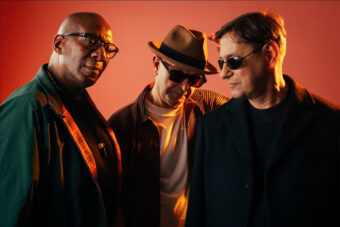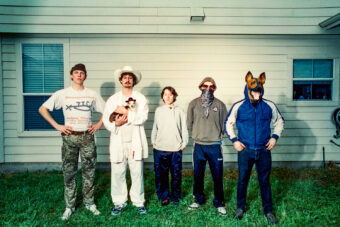Sons and Daughters have Friendsters in high places: Among the 116 “friends” in singer/bassist Adele Bethel’s personal network there are at least three actual members of Franz Ferdinand. According to an online testimonial from a purported Alex Kapranos, Bethel is “very alive. You can see it in her eyes.”
SPIN.com can independently verify that assertion. When we spoke with Bethel, she and her Glaswegian band mates had just come from a lengthy outdoor photo shoot in the swampy New York summer heat. But neither that nor a long subway ride back to the hotel could dampen her spirits. She was bright, lively, and energetic — hardly what one would expect from someone so apparently preoccupied with death. Bethel writes the band’s lyrics, so she’s the most directly responsible for the dark tone of their new record, The Repulsion Box (out in the U.S. August 9). It’s comprised of 10 up-tempo murder ballads, propelled by a relentless rhythm section.
The band isn’t shy about its influences. Their name comes from a Bob Dylan lyric and they’ve written a song called “Johnny Cash.” Their love of American folk and traditional music is as obvious as their Scottish accents, but it’s not the sonics that give this away — Sons and Daughters’ melodies and arrangements are a long way from the Man in Black. It’s the lyrical themes and imagery that make such comparisons inevitable. Songs like “Rama Lama” and “Gone” could have taken place in the same town as “Long Black Veil” or “Cocaine Blues.”
SPIN.com: One of the most interesting things about your band is the fact that you’re this live sounding band with a lot of energy, but all of your songs are about death. It’s a weird contradiction. Is this something you do consciously?
Adele Bethel: Not really. We play fairly catchy music with pretty depressing lyrics. We didn’t construct it that way; it was pretty organic. We were coming from a period in Glasgow when people were overusing effects pedals. We wanted to get away from that. It had become really stale. You had this burst of amazing music coming from there, like Mogwai and Arab Strap, and then everything that followed was just not as good. They were overcompensating for not having a song. That’s why we decided to strip everything back and go with the basics, really.
What was it about American folk music that you were so attracted to?
I just think it has a lot more soul than British folk music. When you grow up in Scotland, Scottish folk music is just the most cringe-worthy, ugly music you can think of. It’s what your parents played at New Year’s. We’ve always been interested in American music. Harry Smith’s Anthology of American Folk Music is what got us into it. It’s really beautiful. It’s got a lot of substance to it, whereas British folk music is about elves and Stonehenge.
How is it that a band from Glasgow can relate to American music so well?
I don’t know, really. When we first started playing we said we were going to pull out everything we liked and just see what happens. It could’ve turned out horrendous; it could’ve just been a big old mess. I don’t think you necessarily have to experience something to write about it. You can see that in music by people like Morrissey. He was holed up in Manchester in his bedroom for like five years with no friends and he managed to create all these beautiful stories.
What’s the Glasgow music scene like?
It’s really incestuous. Everyone knows everyone. [Drummer] David [Gow] and I used to play with Arab Strap. There are only two venues where local bands play. I’ve been going to see bands for 10 years and everybody that’s come along and been in a band I’ve met before. I knew Stuart from Mogwai when I was 14. I met Alex Kapranos when I was about 19 because he was booking bands for a venue. I think if you like music in Glasgow, everyone meets in the same places. You can’t really avoid it.
For a city so out of the way, it has a pretty impressive track record for turning out some great bands. Why is that?
I think it’s because it’s so detached from London, from the media, from any pressures. A lot of bands in London are just competing to get signed. It’s a rush to have a career and get money. The Libertines spawned all these crappy British punk bands trying to sound like the Clash. In Glasgow there are no bands like that. Everyone’s really original. Nobody ever sets out to be in a band to make money, because they don’t think they’re going to make money anyway. Even with the success of bands like Franz Ferdinand, we didn’t really see any rush of A&R men up to Glasgow. In a big city, there are record companies and press that might come to see you play, but in Glasgow you know that’s absolutely, 100 percent not going to happen.
Sons and Daughters tour dates:
9/2, New York, NY (Mercury Lounge)*
9/3, Boston, MA (Middle East)*
9/5, Toronto, ONT (Lee’s Palace)*
9/6, Chicago, IL (Empty Bottle)*
9/7, Minneapolis, MN (TBA)*
9/11, San Francisco, CA (Filmore)
9/12, San Francisco, CA (Filmore)
9/13, Los Angeles, CA (Henry Fonda)
9/14, Los Angeles, CA (Henry Fonda)
9/16, Pomona, CA (Glass House)
9/17, Tuscon, AZ (The Rialto)
9/18, Tempe, AZ (Marquee Theatre)
9/20, Lawrence, KS (Granada Theater)
9/21, Oklahoma City, OK (Diamond Ballroom)
9/22, Ft. Worth, TX (Ridglea Ballroom)
9/23, Houston, TX (Engine Room)
9/24, Austin, TX (La Zona Rosa)
9/27, Tallahassee, FL (Beta Bar)
9/28, Orlando, FL (House of Blues)
9/29, Atlanta, GA (Tabernacle)
9/30, Asheville, NC (The Orange Peels)
10/1, Baltimore, MD (Sonar)
10/2, Washington DC (9:30 Club)
10/4, New York, NY (Webster Hall)
(* without the Decemberists)




